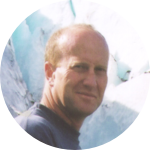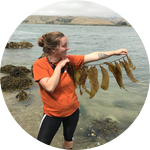About This Project
In Monterey, CA, two of the dominant kelp forest-forming species are giant kelp and bull kelp. From 2014 to 2016, the largest marine heatwave in recorded history developed off the coast of CA, raising temperatures 2-5°C above average sea surface temperatures. This led to the complete replacement of acres of kelp forests with urchin barrens. We seek to explore how urchin food choices and the management of urchin barrens impact the re-establishment and abundance of giant kelp and bull kelp.
Ask the Scientists
Join The DiscussionWhat is the context of this research?
Currently, in Monterey Bay, there are extensive acres of urchin barrens – areas where there are so many urchins that they completely eat all the available kelp. In Spring 2021, urchin fishing restrictions at Monterey Bay’s Tanker Reef will be removed to allow the organized removals of urchins on a large scale. This urchin removal effort provides a unique opportunity in central California to assess urchin impacts on kelp recovery. In order to fully understand how to best restore kelp forests, it is important to understand urchin food preferences for kelps. Bull kelp and giant kelp are both known to be great food sources for urchins, but no studies have investigated urchin preferences between these two species when they grow together or how they impact the survival of young kelps.
What is the significance of this project?
Bull kelp and giant kelp often occupy two different habitats: bull kelp in the north (colder water and larger waves), and giant kelp in the south (warmer water and calmer conditions). In Monterey, these two species are often seen growing close together. While urchins prefer bull kelp and giant kelp over other seaweed species, our study seeks to determine if one of these kelps is more preferable than the other. Answering this question can help us understand whether one of these species is more likely to survive in urchin barrens and establish a kelp canopy faster than the other. As urchin densities are being managed to promote kelp reforestation, my research will provide managers information about the expected results for kelp growth and reforestation.
What are the goals of the project?
I will conduct an experiment on food choice and availability to understand how urchin choices between kelp species may impact kelp vulnerability to urchin grazing. In the lab, I will set up large tanks with different proportions of each kelp to measure how much the urchins eat and whether they eat one kelp more than the other.
After I learn about urchin food choices in the lab, I will outplant kelp in Monterey Bay to compare the effects of urchin grazing and competition among juvenile stages of kelps in sites with both managed and unmanaged urchin populations. I will choose 3 sites in Monterey (one with urchin removal and two without) to plant baby kelp and will come back each month to measure kelp growth and count how many kelps are still surviving.
Budget
Our budget will cover the costs of field and lab work to study the dynamics of urchin-bull kelp-giant kelp relationships.
To collect urchins and algae for lab experiments, we will conduct dives in Monterey Bay. Dive Operation expenses will cover the purchase of equipment (dive bags, tanks and air refills, safety equipment, etc.).
Execution of dives will require travel between Bodega Bay and Monterey Bay (180 miles) and the rental of boats to access sites far from shore, which will be covered by our Boat Operation and Travel expenses.
In the lab, we plan to conduct feeding experiments on urchins and culture kelp for outplanting, which will require the purchase of Laboratory Equipment such as tanks, algae nutrient solution, petri dishes, and other supplies.
Endorsed by
 Project Timeline
Project Timeline
In late June to early July 2021, we will begin surveying the urchin removal sites. In July 2021, we will begin studying the feeding preferences of urchins by conducting laboratory experiments on urchins at Bodega Marine Laboratory: first by testing which kelp urchins eat more of, then by testing how the abundance of kelp affect feeding choices. In September 2021, we will begin culturing kelp in the lab, with the intent to outplant them in May of 2022.
Apr 28, 2021
Project Launched
Jul 12, 2021
Start Urchin Removals with Volunteer Divers
Jul 15, 2021
Begin Experiment 1: Which kelp do urchins eat more?
Aug 15, 2021
Begin Experiment 2: Does the amount of kelp present affect what urchins eat?
Oct 01, 2021
Start Growing Kelp in the Lab
Meet the Team
Angela Korabik
I am an ecologist interested in studying how the impacts of climate change and species introductions affect the way that organisms exist within their surrounding environments. Currently, I study seaweeds, specifically kelp, and analyze how physical differences within the environment - whether along a coastal gradient or across an entire ocean - impact the growth and reproduction of a species.
I am currently a Ph.D. candidate at the University of California, Davis’ Graduate Group in Ecology. I am a member of Ted Grosholz’s lab, which focuses on how human impacts shape coastal ecosystem processes. Prior to graduate school, I received my B.S. in Biological Sciences and B.A. in Chinese Studies at the University of South Carolina, Columbia, where I conducted undergraduate research projects on butterfly feeding preferences and spider web architecture.
In addition to asking questions doing science, I am devoted to making the ocean more accessible to everyone through aquatic fitness and education. To do this, I teach swim lessons, teach courses at dive shops about kelp forest ecology, and organize citizen and community science projects for recreational divers to participate in.
Project Backers
- 47Backers
- 189%Funded
- $4,743Total Donations
- $100.91Average Donation

